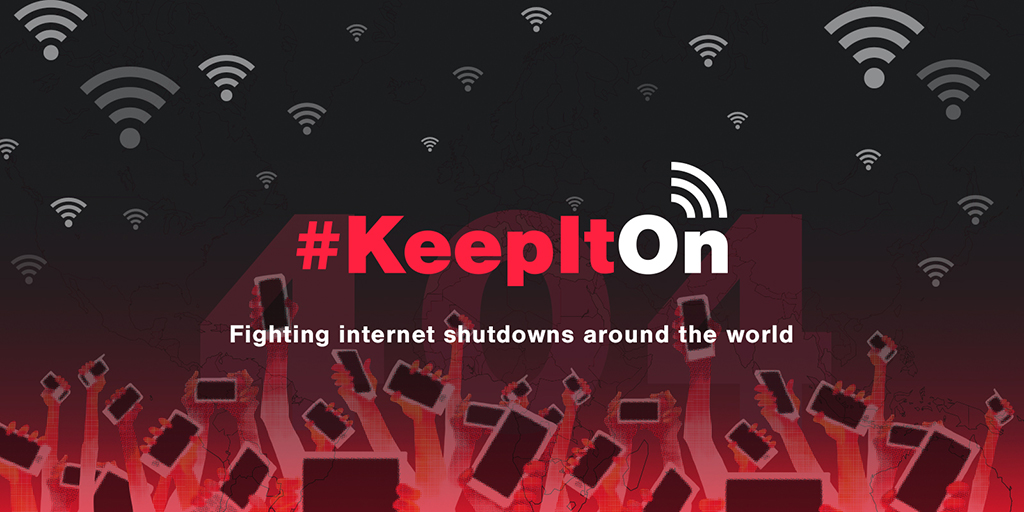Update, 7/25: While Ethiopia reportedly restored access to the internet on 7/23 after imposing internet restrictions for 23 days, it could cut access again. Please join our call for Ethiopia to end all such restrictions permanently.
#KeepItOn: The Ethiopian government must end the arbitrary use of internet shutdowns to quell protests
We, the undersigned organizations and members of the #KeepItOn coalition — a global network of human rights organizations that work to end internet shutdowns — denounce the arbitrary use of internet shutdowns by the Government of Ethiopia in response to protests and unrest in the country. We believe that access to the internet is an enabler of important rights — such as freedom of expression — and must, therefore, be protected and defended by all governments.
On June 29, prominent Oromo musician and social activist, Haacaaluu Hundeessaa, was shot dead by unknown attackers. In response to the unjust killing, numerous protests sprung up in Addis Ababa and other cities in the Oromia region. The protests demanded justice for Hundeessaa, and as they grew in size, culminated in police clashes and military intervention. At least 80 people have been killed, including protesters and security officials, and attacks on property in Addis Ababa and the Oromia region have been reported. In response to these protests, the government ordered a nation-wide internet blackout to quell unrest.
The ongoing internet shutdown is substantially impeding journalists, activists and other relevant actors from monitoring and properly reporting on the ongoing crises in the country. Internet shutdowns during such critical times not only violate people’s fundamental rights to express themselves and access information, but also cultivates a state of confusion and panic. Shutting down the internet makes it difficult for those living in Ethiopia, and the diaspora, to communicate and check up on their families and loved ones — a situation heightened by reports of killings. We reiterate that internet shutdowns only escalate crises and allow authorities to hide atrocities that take place during these blackout periods.
There have also been reports by media outlets in the country that federal police raided the premises of the Oromia Media Network, an Oromo-language broadcaster, and arrested and detained several journalists.
It is high time stakeholders around the world, particularly governments from other African nations, add their voices to condemn the ongoing trend of using internet shutdowns to silence dissent and quell protests on the continent.
The government of Ethiopia is known for its knee-jerk reaction of shutting down the internet at any given opportunity to muzzle dissent and unrest. The internet shutdown of June 30, 2020, adds to the existing long list of cases of government-mandated internet blackouts in Ethiopia. The Abiy-led administration in March, 2020, ended a three-month internet blackout in the Oromia region.
The government of Ethiopia has a responsibility to protect the freedom of expression and access to information rights of all persons in the country, as enshrined in its national constitution, as well as regional and international frameworks including the Universal Declaration of Human Rights, International Convention on Civil and Political Rights and African Charter on Human and Peoples Rights, to which Ethiopia is a signatory. The government should be working to make sure Ethiopians connect to the Internet, not the contrary.
We express serious concern over the government’s decision to shut down the internet. We urgently appeal to the Ethiopian authorities to immediately end the internet shutdown and employ legitimate measures to resolve the ongoing or future protests in the country.
Access Now
Advocacy Initiative for Development (AID)
African Freedom of Expression Exchange (AFEX)
Africa Open Data and Internet Research Foundation
AfroLeadership
Americans for Democracy & Human Rights in Bahrain (ADHRB)
Association for Progressive Communications (APC)
ARTICLE 19 Eastern Africa
Bloggers Association of Kenya (BAKE)
Bloggers of Zambia
Centre for Media Studies and Peacebuilding (CEMESP)
Collaboration on International ICT Policy for East and Southern Africa (CIPESA)
Collectif Sassoufit
Committee to Protect Journalists
Free Expression Myanmar (FEM)
Freedom House
Fundación Internet Bolivia
Human Rights Centre Somaliland
Institute for Media and Society(Nigeria)
Internet Without Borders
Internet Protection Society (Russia)
Kenya ICT Action Network (KICTANet)
League of African Bloggers and Cyber Activists for Democracy – AfricTivistes
Liberia Information Technology Student Union
Media Foundation for West Africa (MFWA)
Media Institute of Southern Africa (MISA)
Media Matters for Democracy
Namibia Media Trust
OpenNet Africa
Open Net Korea
Open Observatory of Network Interference (OONI)
Paradigm Initiative (PIN)
PEN America
Right2Know Campaign
Rudi International
Software Freedom Law Center, India (SFLC.in)
Southeast Asia Freedom of Expression Network (SAFEnet)
Sula Batsu Cooperative Costa Rica
UBUNTEAM (Côte d’Ivoire)
Unwanted Witness Uganda
VE sin Filtro
World Wide Web Foundation
YODET
